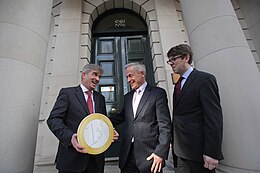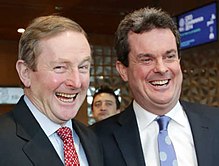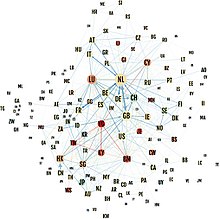International Financial Services Centre, Dublin
[1] It officially began in 1987 as an SEZ on an 11-hectare (27-acre) docklands site in central Dublin, with EU approval to apply a 10% corporate tax rate for "designated financial services activities".
[4] An additional primary goal of the IFSC was to assist the urban renewal and development programme of the North Wall area as a result of its dereliction following the advent of containerisation in the 1960s.
[10] East of Guild Street down as far as the Point Depot is the final part of the IFSC (Docklands Strategic Development Zone, created by Dublin City Council ("DCC") on the dissolution of the DDDA in 2012), as an area containing the Central Bank of Ireland as well the offices of PwC, Credit Suisse and numerous technology companies including Yahoo and WeWork.
This was further expanded by DCC in 2015 into a larger special economic zone ("SEZ") to include the full 22 hectares (54 acres) of North Lotts and Grand Canal Docks sites, taking in both financial and technology services companies.
The concept of a low tax international financial service centre is attributed to Irish businessman Dermot Desmond and politician Ruairi Quinn among others, whose ideas were later picked up by Fianna Fáil leader Charles Haughey and incorporated into his 1987 election manifesto (with contributions from AIB CEO Michael Buckley).
[12] The CHDDA had earlier been created under the auspices of the Garret FitzGerald lead Fine Gael-Labour minority government as a Special Purpose Agency (SPA) in November 1986.
In addition, the Dublin Docklands Development Authority was set up to oversee the expansion of the IFSC's site (most notable being the reclamation of the Grand Canal Basin site)[14] The "dual structure" Irish corporate tax rate, came under pressure from the EC (due to competition rules), and it was agreed that it would expire in 2005.
The IFSC was a major EU securitisation hub and the effect of billion euro special purpose vehicles (or SPVs) collapsing[15] added to the concern over Ireland's financial position.
It did not help that these SPVs (and other IFSC type activities) produced a further distorted picture of Ireland's already precarious National Accounts statistics.
Further academic studies showed that the IFSC SPV sector was operating in an almost unregulated fashion where structures were more akin to brass plate companies.
[23] The IFSC has now become one of Europe's most important centres for § Fund administration and domiciling, and § Securitisation, and ultimately became the birthplace of and global leader in § Aircraft leasing.
[25] They have become associated with the creation and development of international tax management tools,[26] (such as the Double Irish, single malt, and capital allowances for intangible assets (CAIA) BEPS tools; and Section 110 SPV, QIAIF and ICAV zero-tax legal structures), leading to concerns of Ireland as a tax haven.
[9][27] In 2017, a University of Amsterdam study estimated that the IFSC was one of the world's largest conduit OFCs for facilitating global corporate tax avoidance.
[28][29] In 2018, a Gabriel Zucman study estimated that Ireland had become the world's largest corporate tax haven by virtue of its use as a Conduit OFC.
However, ultimately few of these companies established offices which offered these services or relocated to Dublin in the following years and while the level of material employment has grown significantly relative to its former size, it is still well below many of the larger European financial centres in overall terms such as Frankfurt, London or Paris.
[33] The four largest global fund administration and custody providers all have major offices in the IFSC State Street, BNY Mellon, Citibank and Northern Trust, as well as internal fund administration departments from major global investment banks such as JPMorgan Chase, Goldman Sachs and Bank of America.
The IFSC occasionally provides an accounting and administration service for products sold on a pan-EU basis through the parent's main channels.
[51] Additionally, investments and acquisitions are also made by non-domestic firms such as Brookfield Asset Management's €120M takeover of Imagine Communications, Insight Partner's purchase of a €100m stake in the AMCS Group (in conjunction with the ISIF) and Apollo's takeover of Ireland's largest hotel chain Tifco in a €600m deal in 2018.
[52] Domestic private equity firms include Renatus[53] and most notably Causeway Capital who were responsible for the rescue of Patisserie Valerie in February 2019.
[65][66] The CAIA BEPS tool requires multinationals to create virtual internal intellectual property (IP) assets in offshore locations (e.g. Apple used Jersey).
The Xinhua–Dow Jones International Financial Centers Development Index (IFCD) was a ranking of circa 45 major global financial centres, and was compiled annually by the Xinhua News Agency of China with the Chicago Mercantile Exchange and Dow Jones & Company of the United States from 2010 to 2014; the IFSC (or Dublin) ranked 37th overall of 45 centres in the final 2014 IFCD Index.
[30][31][32] The role that the major IFSC accounting and IFSC law firms have played in creating Irish tax haven-type legal structures, including Double Irish, Single malt, and Capital allowances for intangible assets (CAIA) BEPS tools, as well as Section 110 SPV, QIAIF and ICAV zero-tax legal structures, has been chronicled.
[100][101][102][103][104] Research in 2017–2018 by Trinity College Dublin finance Professor Jim Stewart, and Cillian Doyle, showed many IFSC SPVs are unregulated brass plate structures attracting little oversight by the Revenue Commissioners or Central Bank of Ireland, and with local individuals holding hundreds of SPV directorships.
[107] In 2018, a former Deputy Governor of the Central Bank of Ireland stated that the risks from abuses of IFSC SPVs was not fully appreciated by the Irish Government.






Brad Setser & Cole Frank ( CoFR ), [ 56 ]

